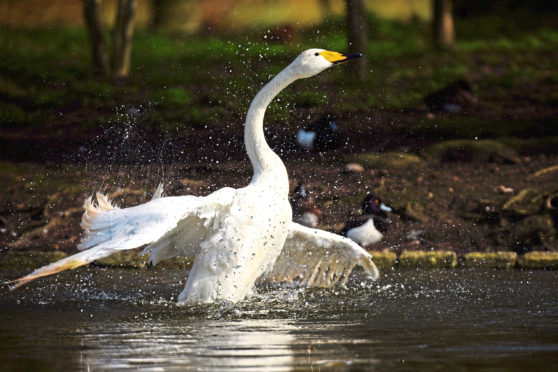YOU know the song of course, or at least the first verse: “In the bleak midwinter, Frosty wind made moan, Earth stood hard as iron, Water like a stone, Snow had fallen, snow on snow, Snow on snow, In the bleak midwinter, Long ago.”
Christina Georgina Rossetti’s verse displays a poetic verve a cut above the humdrum hymn-cum-carol in the Church Hymnary. Poetry was her day job, after all. I love “Snow had fallen, snow on snow, Snow on snow.” The word “snow” used five times in two lines, there’s a poet’s daring for you! And while it’s true that Hymn 50 quickly descends into the more typical Christmas nonsense of seraphim and cherubim thronging the air, that first verse is winter in a nutshell.
The one word I have a problem with is “bleak”. Lyrically, it’s perfect, but such a fusion of ice and relentless snow is the stuff of wonder and beauty, not bleakness. The (sadly) unwritten next verse should have reassured – soon the snow would stop, the sun would explode and diamond dust would drift through streets so that children would laugh and dance and neighbours would stand outside their doors in wonder.
Whatever happened to bleak midwinter?
The call of the swans
My day often begins with a walk of anything between one and two hours that pauses en route to buy newspapers and coffee. I sometimes count bird species while I walk. I am not instinctively a bird-counter, nor do I keep records of numbers or dates. The particular value of the exercise is to take note of small variations to the familiar roll-call. Antennae twitch to an unfamiliar voice. For instance:
On this month’s one truly midwinter morning with a hard frost, overnight snow on the Ochils, almost nothing was moving. Then a two-syllable call fell to earth and made my day. It was pitched somewhere between the voices of a clarinet and a muted flugelhorn, and it was high and over my right shoulder. I turned to see a family of five whooper swans, two adults and three of this year’s cygnets heading west. They came directly overhead about 200 feet up, vanished over the rooftops.
My debt to the wild swans of the north is hard to articulate, and as for repaying it, I wouldn’t know how to begin. But they acted on my mood like a fork of lightning out of a clear sky. I walked on with a headful of swans. For instance, there was an old midwinter by a lochan in the south of Skye, another family of five whoopers. I had heard them from some distance away, so reached the nearest shore squirming with my chin in the peat, just in time to see the cob rise up on the water and stand there, ankle deep. He had found a submerged rock, which is a favourite perch of swans everywhere, and began to preen. The pen on the water drifted towards him with her head deep in the feathers of her back and folded wings, preening as she swam. In that compact pose she passed idly in front of him.
A moment of raw beauty
Sooner or later in a water-borne preening routine, an adult swan stretches head and neck and appears to “stand” on its tail, opens its wings and beats them forcefully so that the sound of them snaps like drying sheets in a big wind. At the precise moment the pen reached him, the cob unfurled that heroic pose. For perhaps five seconds, his furled mate was canopied by the one wing beneath which she swam. One midwinter moment made immortal by raw beauty.
Then she drifted on, reassembled herself into a swan shape, and he was simply a preening, standing swan again.
I liked the words to a radio reporter of the hotel owner in Altnahara in Sutherland 10 years ago, when snow closed everything and the temperature plunged to -20C: “It’s a little bit of winter heaven when the freezing fog lifts. It’s really beautiful just now.”
Alas, she had no hotel guests to share it.
The nature of our winter
It all depends on the school of thought you inhabit – Snow on snow, In the bleak midwinter, Long ago, or a little bit of winter heaven.
If only Christina Georgina Rossetti had been marooned in Altnahara, Sutherland, rather than Highgate Hill, London N6, she might have been of the “little bit of heaven” persuasion. After all, it’s better material for a Christmas song than “In The Bleak Midwinter”.
The nature of our winters is transformed and goes on transforming. I’m writing this on the kind of day that always make me think of Hugh MacDiarmid: “O wae’s me on the weary days, When it’s scarce grey licht at noon, It maun be a’ the stupid folk, Diffusin’ their dullness roon and roon, Like soot, hat keeps the sunlicht oot.
I looked out at cold, wet mid-afternoon darkness – my idea of “bleak” – and thought these were good lines with which to define a pro-Brexit Government.
What did happen to bleak midwinter?










